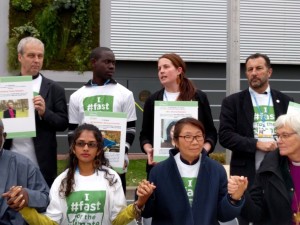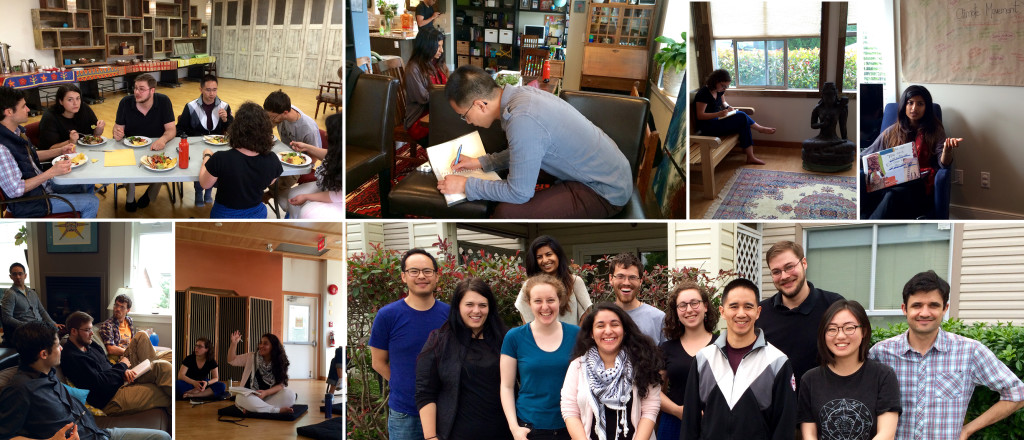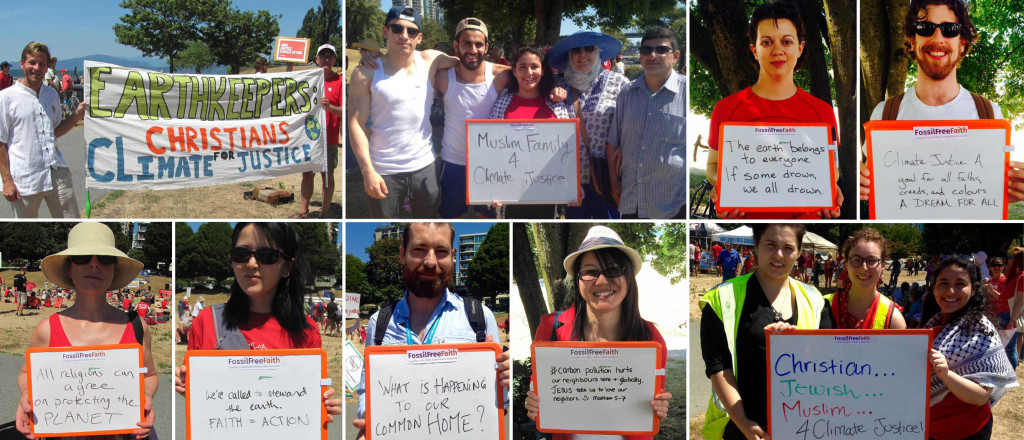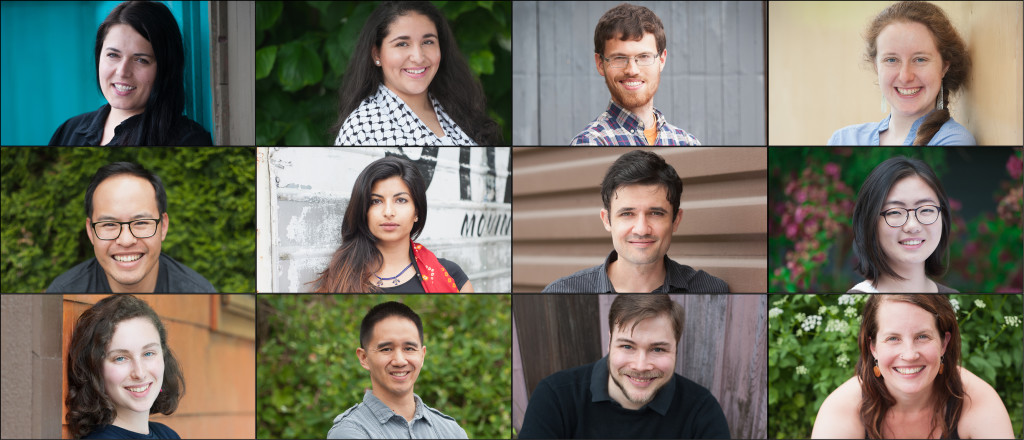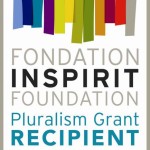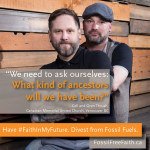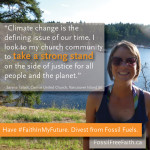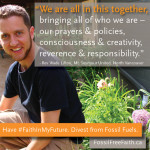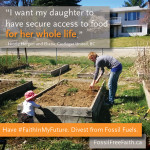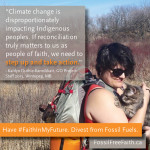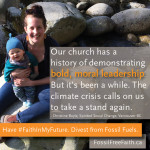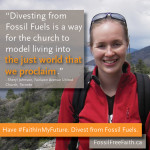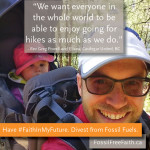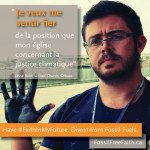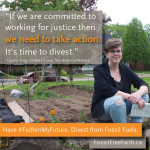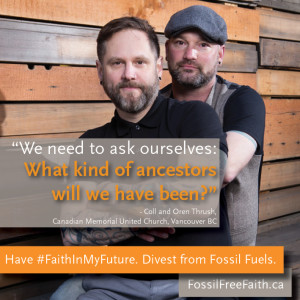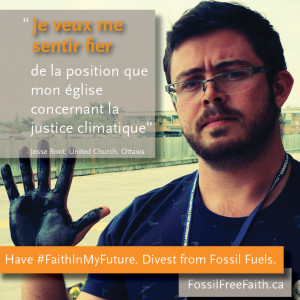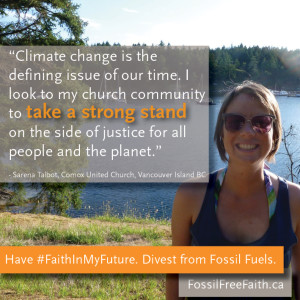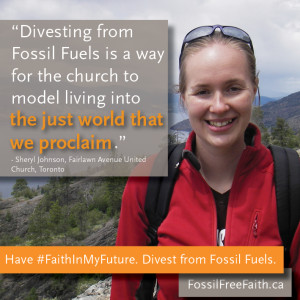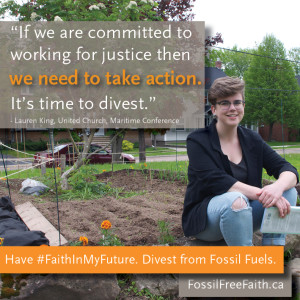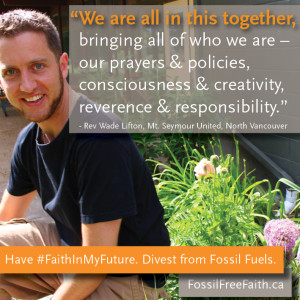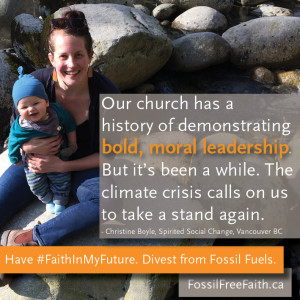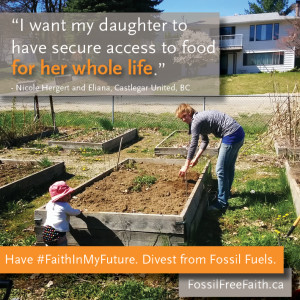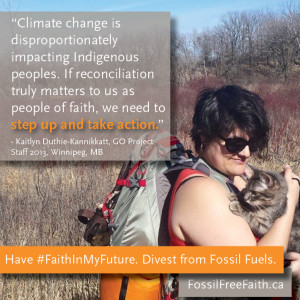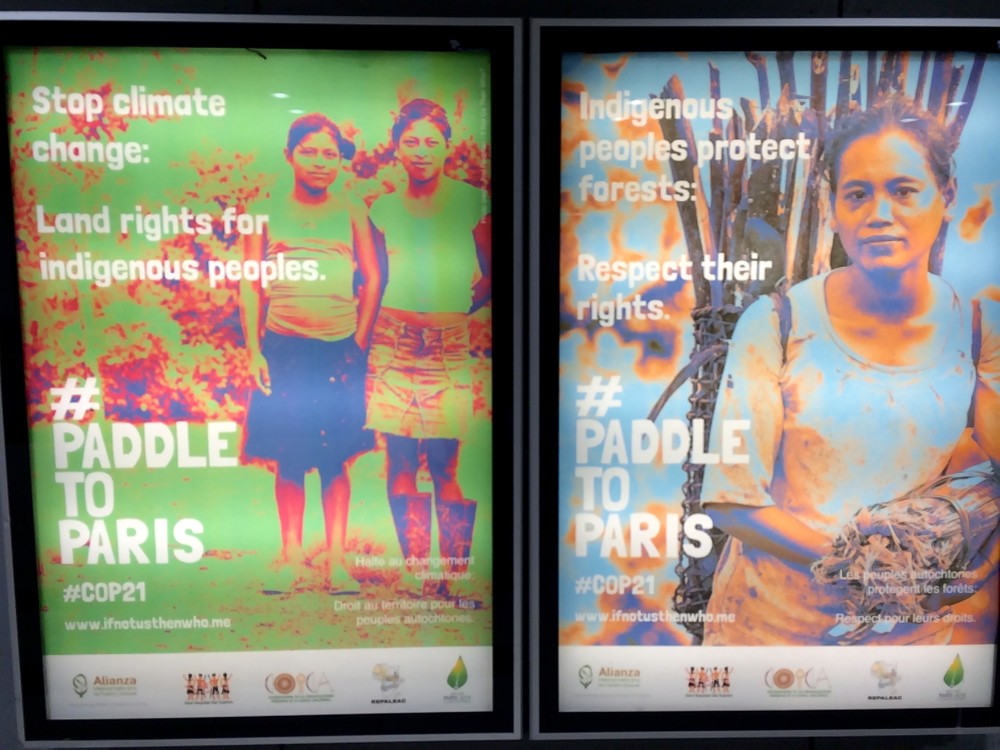
From COP21 – The Local and the Global
Paris is a long way from the places that I call home. Trying to schedule phone calls with my partner and kids back home, with a 9-hour time difference, has served as a regular reminder of this.
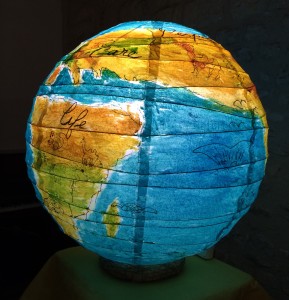 And increasingly, over the past few years, my climate work has felt localized. Systemic, absolutely. Intersectional, sure. But rooted in the places and the people that I call home.
And increasingly, over the past few years, my climate work has felt localized. Systemic, absolutely. Intersectional, sure. But rooted in the places and the people that I call home.
During graduate school, one of my favourite theologians was a Brazilian Catholic nun named Ivone Gebara. An eco-feminist and liberation theologian, Gebara lit fires and connected dots for me.
In her book, Longing for Running Water, Gebara talks about God as relatedness, and she talks about relatedness as a human and earthly condition. She says,
“My initial relationship with the earth is not with Earth as a planet that is part of the solar system, but with the earth on which I took my first steps; on which, in time, I took firmer steps; and on which I jumped, rolled, and shed tears. My initial relatedness with the earth is with the soil upon which I was born and through which all my other relationships have been mediated.”
Before this trip I spent a lot of time considering what value my localized climate work had at a global meeting like the COP. Here where we’re talking about:
- Long-term climate reduction targets (Canada needs to get back on track to meet our 2020 targets, and make ambitious but achievable plans to decarbonizes by 2050)
- Mechanisms to limit global warming levels (nearly all countries have committed to a max 2-degree increase, but the combined plans that they have submitted amount to a 2.7-degree increase, and the reality is that anything over 1.5 degrees is fatal for large, climate-vulnerable regions)
- Billions of dollars to support mitigation and adaptation efforts globally (the additional call from impacted regions is for increased funds for ‘loss and damages’ for the climate impacts that they, with their low carbon footprint, didn’t cause but are feeling most)
- Legally binding commitments, 5-year commitment periods, adequate assessment, and a progression clause to ensure commitments scale up over time.
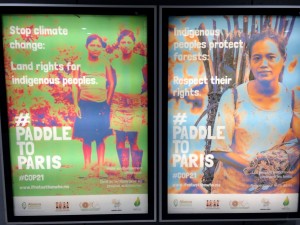 None of this is familiar language to me. It feels worlds away, not just 9 hours away, from the earth on which I took my first steps. World away from, but related to, our fights at home to block risky pipelines on Indigenous lands, and reduce tanker traffic on pristine coast, and prevent massive investment in infrastructure projects that lock us into the old economy, and make clear that fracking natural gas is not a climate solution.
None of this is familiar language to me. It feels worlds away, not just 9 hours away, from the earth on which I took my first steps. World away from, but related to, our fights at home to block risky pipelines on Indigenous lands, and reduce tanker traffic on pristine coast, and prevent massive investment in infrastructure projects that lock us into the old economy, and make clear that fracking natural gas is not a climate solution.
 At a Monday panel on faith-based engagement on the climate crisis, Fazlun Khalid, from the Islamic Foundation for Ecology and Environmental Sciences (IFEES), spoke about how the world’s water supplies are limited and constantly recirculating. And he said for him the poignant realization out of that reality is that you and I have probably drank the same water, swam in the same water, bathed in the same water.
At a Monday panel on faith-based engagement on the climate crisis, Fazlun Khalid, from the Islamic Foundation for Ecology and Environmental Sciences (IFEES), spoke about how the world’s water supplies are limited and constantly recirculating. And he said for him the poignant realization out of that reality is that you and I have probably drank the same water, swam in the same water, bathed in the same water.
I am in Paris to protect my beloved Pacific Coast, and to amplify the voices of the Indigenous people whose land I call home, to defend the future for my children. And I am in Paris to protect your coasts, to listen to the voices of impacted communities everywhere, to defend the future for your children too.
If I am homesick, it is amplified by the depth of love that activists and advocates here have for their own homes, their own earth and soil. It is a reminder of why this, and all of our climate justice work, matters.
Christine Boyle is one of the United Church of Canada’s delegates to COP21. She is the Director of Spirited Social Change, and a co-founder of Fossil Free Faith. She is based on unceded Coast Salish Territory. You can follow her COP21 tweets @christineeboyle or see pictures here.

Alternative Investments
Alternative Investments: Summary of Resources
Author: Walter Whiteley, Trinity-St. Paul’s United Church Climate Justice Group
Disclaimer: This document does not provide investment advice, and should not be taken as investment advice. It is prudent that individuals and institutions obtain advice from a qualified investment advisor or an investment manager before you make any investment. We are presenting a range of links and resources to follow up with your investment advisor.
Overview: Reinvestment has several layers:
- a) Investments that screen out fossil fuel companies (along with tobacco, weapons, gambling, … ).
- b) Positive investments that develop alternative energy sources and related energy infrastructure, as well as in sustainable, resilient infrastructure, and upgrades that save energy.
- c) Some of the alternatives below also focus in social capital: locally controlled, perhaps cooperative community development, as a positive way forward.
A quick summary of the steps to reinvest (for individuals and institutions)
- a) Do our best with what is available now http://riacanada.ca/wp-content/uploads/2014-Q2-RI-Funds-in-Canada-EN-FINAL.pdf
- b) Do your own investigation into holdings using mutual fund information available online
- c) Consider sending a letter to your current mutual fund. See this sample letter.
- d) Create a portfolio of individual stocks and bonds that reflect your values, on line or with the help of an advisor
- e) Use an advisor/ portfolio manager who will listen to what you want and create a low /no carbon portfolio for you.
- f) Use sector based ETFS or mutual funds to avoid the energy sector.
- g) Use the S&P/TSX Renewable Energy and Clean Technology Index to find companies that can help us transition to a low carbon economy tmxmoney.com/tmx_indices.php?section=tsx&index=%5ETXCT
General advice and information
- a) Sustainable Economist http://www.sustainableeconomist.comTimothy Nash’s website has power point presentation on the topic Divest and Reinvest (from the Convergence workshops last fall in Montreal).
- b) A number of links on how to find alternatives (US based): http://divestinvest.org/philanthropy/resources/
- c) A Canadian site which has guidance for individuals to move into socially responsible investment: http://www.ethiquette.ca/en/
- d) Extracting Fossil Fuels from your Portfolio: An Updated guide to Personal Divestment and Reinvestmentby 350.org, Green Century Capital Management and Trillium Asset Management
Available to institutions (Accredited Investors Only Institutions )
Green Chip http://greenchipfinancial.com
Alternative energy and Reduction of energy use (Global, with some Canadian content)
Contact John Cook (in Toronto)
Genus Capital Management http://genuscap.com
Has full suite of 5 fully fossil-free investment pools, including bonds, and global equity
Handles investments for some foundations and churches, and fee reductions for combined institutions. Contact TSP for information as a possible partner.
JP Harrison
Investigating possible grouping of investments by individuals too meet minimum investment of $500,000, or teaming with larger manager to permit $50,000 investments, including RRSPs (in Vancouver)
Inhance Investments has a suite of SRI funds: http://www.iaclarington.com/en/products/inhance-sri-funds/inhance-sri-funds.aspx#
The Global SRI fund is fossil free and has 7.9% in alternative energy.
This is open to both individuals and institutions.
AGF Global Sustainable Growth Equity Fund is a new fund which is fossil free: http://www.agf.com/sustainableinvesting
The page includes a number of other links to reports related to Fossil Fuel Divestment, and positive investments.
CIBC Blue Heron funds have a strong set of screens, including being fossil free . Minimum amount is $100,000 and they may be open to individuals: http://www.cibcwg.com/web/blueheronadvisorygroup/home
4. Community Bonds
“How a community bond turns social capital into financial capital” by Elisa Birnbaum in Financial Post, Dec 22, 2014
The story demonstrates the power of everyday citizens who are supporting social enterprises when traditional methods fall short.
Related links here:
- a) http://socialinnovation.ca/sites/default/files/CommunityBondTrio-lo.pdf
- b) Centre for Social Innovation3% to 4.5%
- c) SolarShare 5 years at 5% , and
- d) ZooShare 7% for 7 Years
Also see:
- a) Northern Solar Bonds
http://www.greentimiskaming.ca/northern_solar_bonds/
– Starting at 5% for 20 year bonds climbing to 12.75%
– 4.5% for 5 year bonds - b) Oikocredit: Mennonite Savings and Credit Union provides GICs linked to Oikocredit:https://www.mscu.com/SIA/Oikocredit/
– The estimated return is 1.3%, and the principle is guaranteed under the Deposit Insurance Corporation of Ontario. - c) Green Bonds (watch for Green Washing – what standards are there?).
- d) World Bank Green Bonds (How green?) http://www.worldbank.org/en/topic/climatechange/brief/green-bonds-climate-finance Not clear who can invest, and at what rate(s).
- e) Ontario Global Green Bonds http://www.ofina.on.ca/greenbonds/issues.htm75% return
5. Publicly Traded Alternative Energy Companies in Canada.
There are some companies in Canada identified as working in the alternative energy sector over a period of years. This list is not comprehensive, or based on their current investment returns.
- a) TransAlta Renewables (projects in Canada, one in the US): http://www.transaltarenewables.com
- b) Brookfield Renewable Energy Partners (projects globally) https://www.brookfieldrenewable.com
- c) Algonquin Power (projects in Canada and the US): http://www.algonquinpower.com
- d) Northland Power (projects in Canada and Europe): http://www.northlandpower.ca/Default.aspx
There are many more such companies in the US and Europe.
For example see sites like http://www.greentechmedia.com/articles/read/how-to-invest-in-renewables
- Investment Managers and Advisors
A full list of members of the Responsible Investment Organization: http://riacanada.ca
A few advisors who have extended experience with Socially Responsible Investments. All are working with some individuals and congregations engaged in divesting:
Toronto
Sucheta Rajagopal Portfolio Manager, Jacob Securities Inc.
Email: srajagopal@jacobsecurities.com Tel: 416 866-8362
Alan Harmon, Wealth Advisor (Works for several churches)
Email: alan.harman@scotiamcleod.com Tel: (416) 862-5836
http://www.advisors.scotiamcleod.com/aharman
Ottawa
Tricia K. Spooner, Investment Advisor
Email: tricia.spooner@cibc.com Tel: (613) 239-2851
http://www.cibcwg.com/web/tricia-spooner/about-cibc-wood-gundy1
John Hastings, , RBC Dominion Securities Inc. https://profile.rbcwealthmanagement.com/john.hastings
Phone: 613-566-2003
Walter Traversy, CIBC Wood Gundy
http://www.cibcwg.com/web/walter-traversy/home
Phone: 613-271-1511
Fossil Free Indexes:
http://fossilfreeindexes.com/
http://web.tmxmoney.com/tmx_indices.php?section=tsx&index=^TXCT
Mission Based Investing:
Why should only the income returned from investments be used for our mission? Why not use all of our investment decisions to support the mission?
Link to Social Economy Center Presentation by Bill Young on Mission Related Investing:http://www.socialeconomycentre.ca/sites/default/files/MissionRelatedInvesting.pdf
OIKO Credit bonds (above) and Canadian Alternative Investment Cooperative (CAIC) http://www.caic.ca/apply.html are examples mission based investing used by some religious groups, including the national United Church of Canada`
Easy-as-Pie Reinvestment Option: from the Sustainable Economist:
http://www.sustainableeconomist.com/easy_as_pie_portfolio
(1) Global Equity 60% Inhance Global Equity SRI Class F-Series (CCM5013) Could choose Fossil-Free – see above)
(2) Government Bonds 30% iShares 1-10 Year Laddered Government Bond Index ETF (CLG)
(3) Impact Bonds 10% Oikocredit Global Impact GIC (see above)
On-line stories about individuals around the world divesting:
The Guardian is planning a global webinar on individual divestment: See article and sign up for webinar series
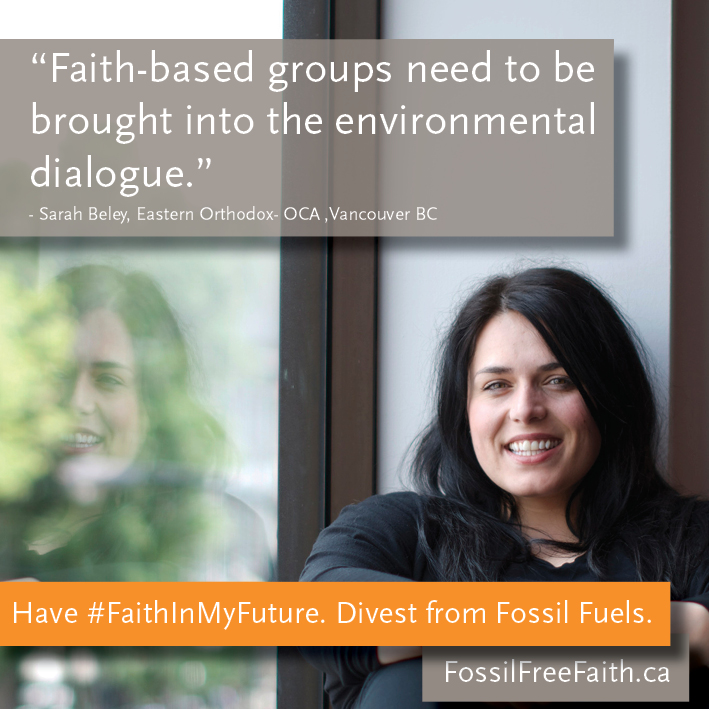
Our youth fellows have big dreams, and tons of skill
In January 2015, Fossil Free Faith launched a call for religious-or-spiritual youth concerned about climate change to be part of a fellowship program aimed amplifying young, faithful voices for climate justice.
We had an incredible group apply. And over the past 10 months, we’ve been making it happen. Here’s some of what the Fossil Free Faith Youth Fellows have been up to:
On May 24-26th, we gathered for an intensive weekend training at Bridge and Enrich in East-Vancouver. We shared stories, and shared food, and did training on climate science, economics, communications, social movements and theories of change.
Following the training, a number of fellows wrote blog posts for our friends at Faith & the Common Good/Greening Sacred Spaces.
Maisaloon Al-Ashkar: From the Heart
Talia Martz-Oberlander: Using the personal narrative to move climate justice forward
Leo Yu: The Pope, the Dutch and other Reflections
Sarah Beley: Bringing faith-based groups into the environmental dialogue
They also began mobilizing to build a stronger faith-based presence at the upcoming Jobs, Justice & Climate rally in Vancouver. They participated in 350 Vancouver planning meetings. And then hosted Calling on Faith Voices – a dialogue to mobilize faith communities around climate issues. On July 4th the fellows organized and hosted a hugely successful ‘Faith Hub’ at the Jobs, Justice & Climate rally. And FFF fellow Maisaloon was one of the rally’s keynote speakers.
The following day, our friends and collaborators hosted a Multifaith Climate Iftar, following the Jobs, Justice & Climate rally in Toronto.
Around the same time, Fossil Free Faith Coordinator Christine Boyle wrote Why the Pope has caught this non-Catholic’s Attention, before heading to Rome to represent Fossil Free Faith Canada at the Our Voices Emerging Leaders Multi-Faith Climate Convergence.
And the project gained some media attention. Including an article in the Vancouver Courier called Keeping the Fossil Free Faith. And a feature article in the Jewish Independant about Talia and her work for Climate Justice. As well as significant media coverage on the United Church of Canada’s national divestment decision, which Fossil Free Faith was involved in.
Our fellows kept doing their own organizing. Sarah hosted a public event called Conversations with Heart: Dialogue for Healthier Communities. Jason, Eduardo and others were part of launching EarthKeepers: Christians for Climate Justice at the 10th Ave Christian Alliance Church in Vancouver. Eduardo published “Dejó Huella el Nazareno”, a book of poetic and theological reflection on the gospel and creation (in Spanish), and traveled home to Costa Rica to launch it. And others have been doing less visible work, talking and listening and bearing witness to the need for faithful climate justice.
And they kept writing and speaking. Leo wrote two op-eds about faith and action: What our leaders aren’t telling you: Jesus was a radical social activist and Finding the courage to take action. Talia wrote This Year I’m Praying for a New Government for Ricochet Media. And Christine spoke as part of the Earth and Spirit Speaker Series at St. Anselm’s Anglican Church.
And we have officially launched the Faithful Voices Speakers Bureau. Because conversations about both faith and climate in Canada need some fresh voices. Interested in having one of them join a panel at an event or conference you are organizing? Or guest-preach in your congregation? Or contribute to your newsletter, magazine or blog? Contact us to make a request.
The pilot project of this youth network was supported by the Inspirit Foundation, and powered by Faith & the Common Good and Spirited Social Change. For more information email: christine (at) spiritedsocialchange (dot) org.
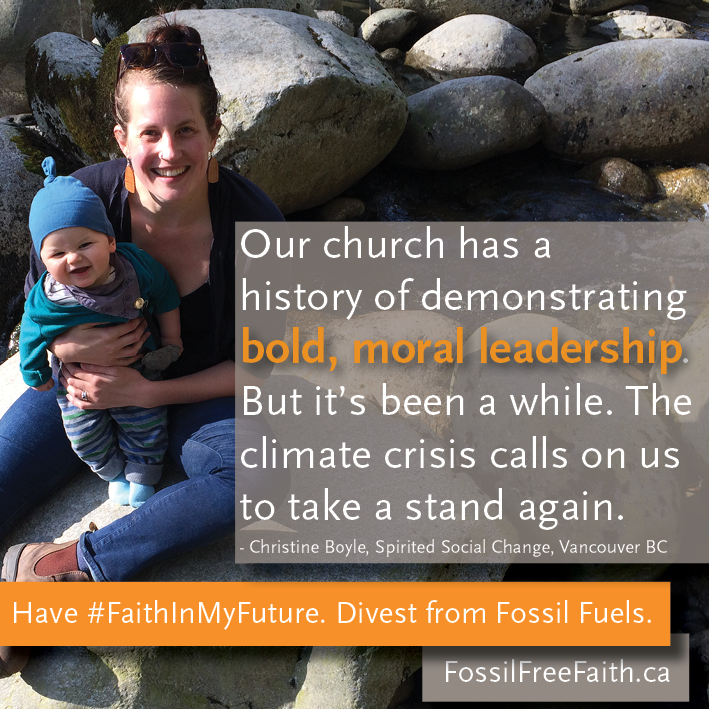
United Church of Canada Votes to Divest from Fossil Fuels
On August 11th, 2105 the United Church of Canada voted to sell its fossil fuel assets and commit financially to transitioning to an economy based on renewable energy. The vote was held by the 42nd General Council, the United Church’s highest body, which meets triennially to determine the denomination’s priorities. Climate justice, whereby the world’s most vulnerable populations avoid disproportionate harms of climate chaos, stands as a clear priority for Canada’s largest protestant denomination.
“The United Church of Canada has voiced its concern about human-induced climate catastrophe for decades. Given the lack of political and industrial leadership to address climate concerns in a way that matches the scale of the problem, we wanted to signal that we are so serious about averting climate crisis that we are willing to put our money where our mouth is,” said Christine Boyle, the General Council commissioner, parent, and long-time climate advocate. “Many in the United Church see Jesus as a friend of the poor and an advocate for the marginalized. Today we have committed to journeying in his footsteps, raising our moral voices to address the burdens of climate chaos that disproportionately affects those living on the margins.”
The denomination has addressed the climate crisis several times at previous General Councils. This is the first time it has committed to moving its investments away from fossil fuels the same way it moved away from tobacco and gambling companies years ago.
“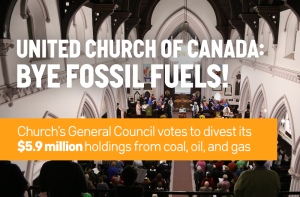 The United Church of Canada has lived into the policies that it has developed over the past 20 on climate justice, and is taking prophetic leadership,” said Jeanne Moffat, a leader with Trinity-St. Paul’s United Church’s climate justice group. “We should see this as a symbol of hope for the climate justice movement.” Folks from across Canada have worked on this for years, finding inspiration from a similar initiative to end apartheid in South Africa and from what the World Council of Churches and other faith communities across the globe are doing to transition to a sustainable future.”
The United Church of Canada has lived into the policies that it has developed over the past 20 on climate justice, and is taking prophetic leadership,” said Jeanne Moffat, a leader with Trinity-St. Paul’s United Church’s climate justice group. “We should see this as a symbol of hope for the climate justice movement.” Folks from across Canada have worked on this for years, finding inspiration from a similar initiative to end apartheid in South Africa and from what the World Council of Churches and other faith communities across the globe are doing to transition to a sustainable future.”
The motion for the General Council to divest follows motions at Conferences across the country. At its conference in May, oil-rich Alberta voted to articulate a vision of Canada without fossil fuels. Both Toronto Conference and Manitou Conference also sent divestment proposals to General Council.
During the debate on the issue, commissioners voiced concern for people in Alberta, Saskatchewan and elsewhere who will need support to transition away from economies that are presently so dependent on fossil fuels.
The General Council Executive will now chart the path for the Treasury to sell its holdings of the world’s 200 largest fossil fuel companies, and to take active steps to re-invest those assets in green renewable energy co-operatives. Currently these holdings constitute $5.9 million, or 4.7% of the United Church of Canada Treasury.
Media Coverage to date:
United Church to drop fossil fuels from investments due to climate concerns
570 News – Aug 11, 2015
- Coll Thrush, United Church
- Sarena Talbot, United Church
- Rev Wade Lifton, United Church
- Nicole Hergert, United Church
- Kaitlyn Duthie-Kannikkatt, Catholic
- Christine Boyle, United Church
- Jesse Root, United Church
- Lauren King, United Church
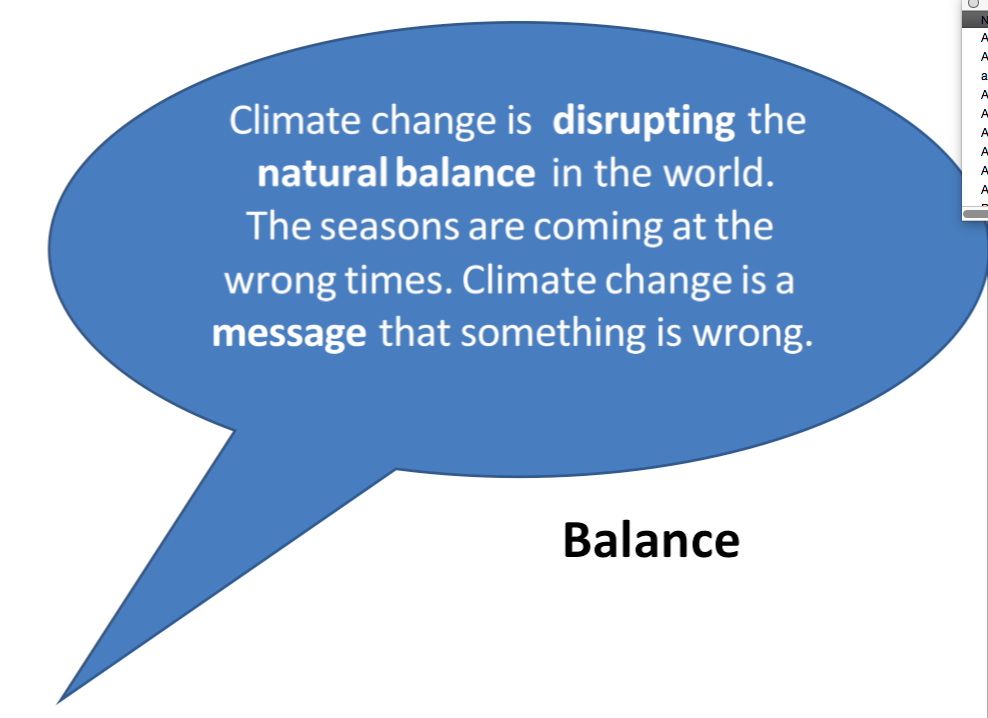
Messages to mobilize people of faith on climate change
Our Voices (a campaign of GreenFaith and the Conservation Foundation) commissioned the Climate Outreach & Information Network (COIN) to develop and test language around climate change that could mobilize activity across the world’s 5 main faith groups: Buddhist, Christian, Hindu, Jewish and Muslim.
5 overall lessons
1. Be Cautious With Blame And Fear
2. Present Threats And Solutions In Terms Of Core Values
3. Promote Rewards Of Stronger Faith And Belonging
4. Create A Narrative Arc
5. Find Specific Language For Each Faith Within A Narrative Theme
It’s an incredibly valuable document for shaping messages around climate change within faith communities. Download the full resource HERE.
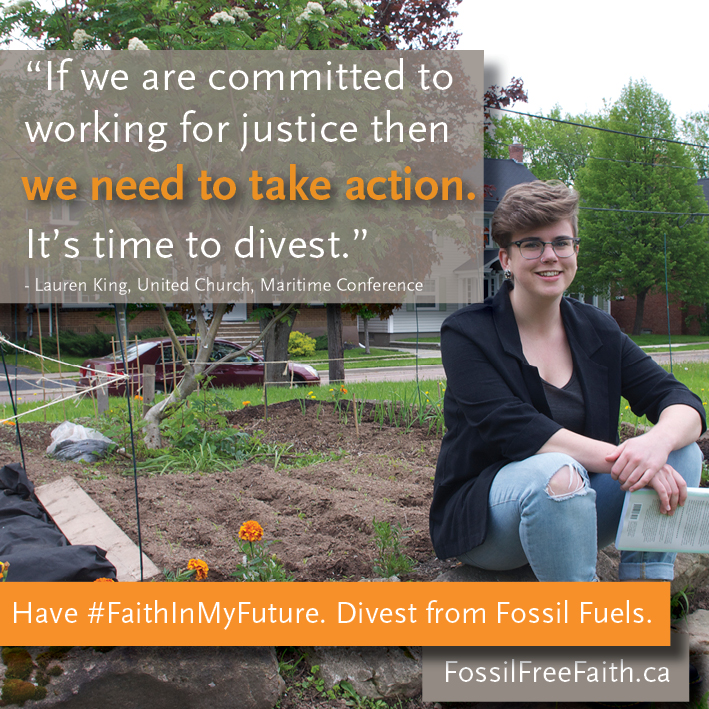
The United Church to vote on Divestment
On August 11th, at the United Church of Canada’s national General Council meeting, commissioners from across the country will vote on motions for the church to divest from the top 200 fossil fuel companies, and re-invest in clean energy alternatives.
You can find the full text of the motions here.
Click here to download a fossil fuel divestment primer or click here to download a pamphlet on divestment from Trinity St Paul’s United Church in Toronto.
Stay updated by following us on Facebook or following us on Twitter.
- Coll Thrush, United Church
- Jesse Root, United Church
- Sarena Talbot, United Church
- Lauren King, United Church
- Rev Wade Lifton, United Church
- Christine Boyle, United Church
- Nicole Hergert, United Church
- Kaitlyn Duthie-Kannikkatt, Catholic
